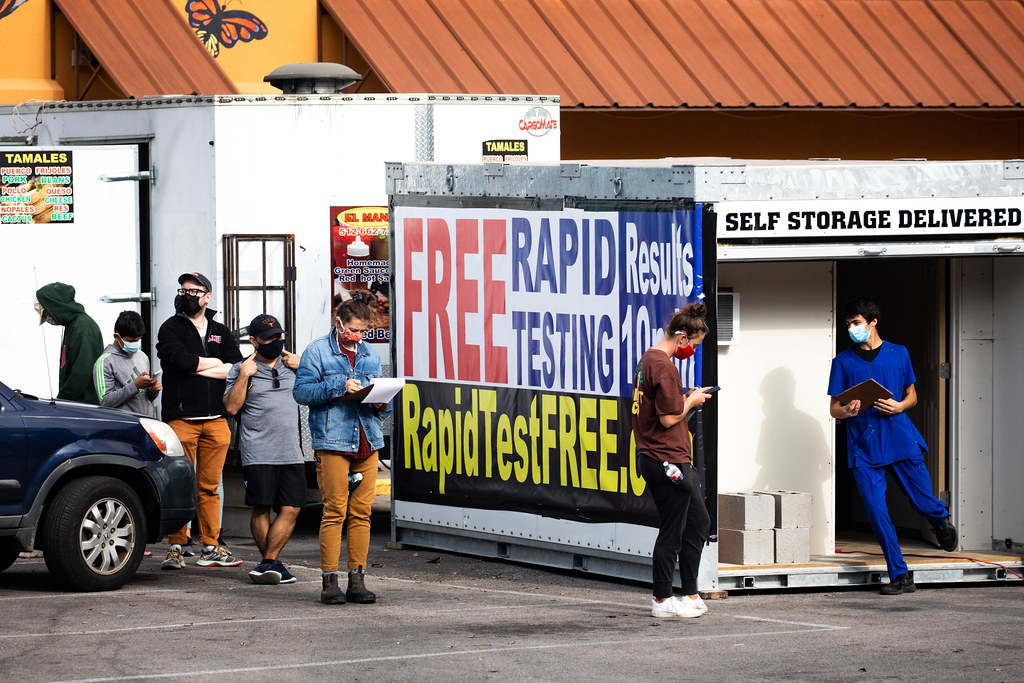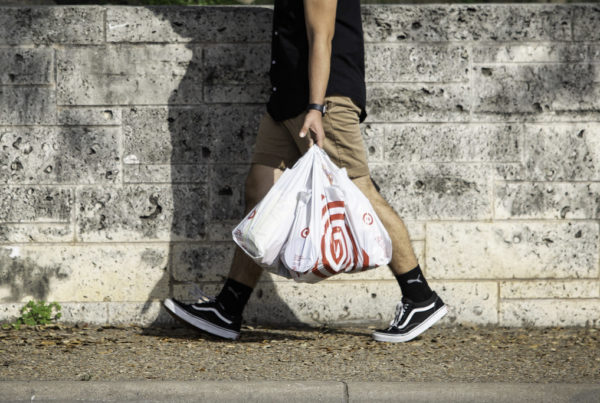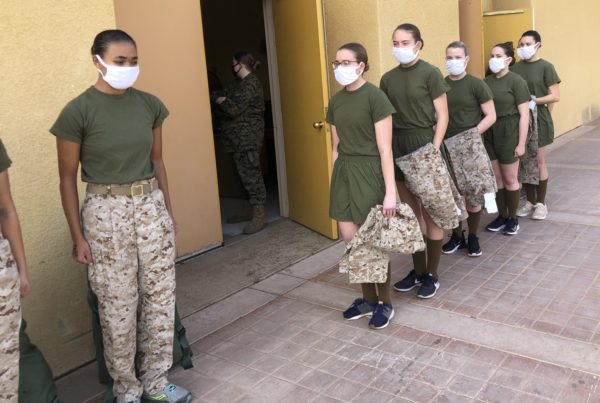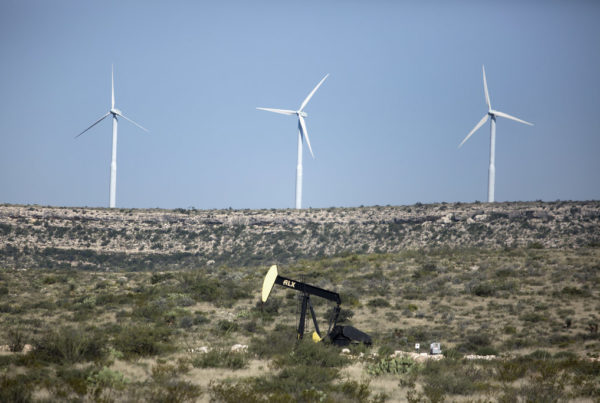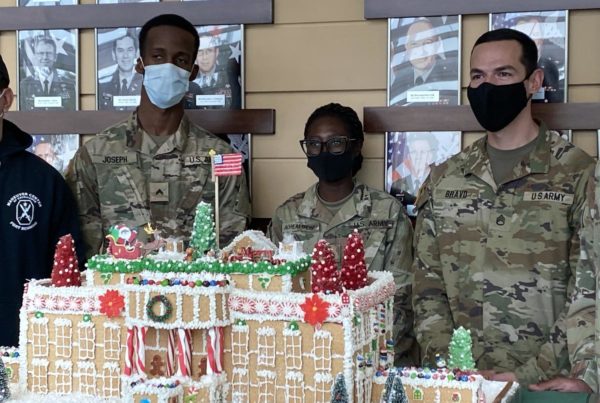Texas is experiencing a surge of COVID-19 cases caused by the omicron variant of the coronavirus. Infectious disease experts say omicron is much more contagious than other variants, but its symptoms can often be less severe for people who have been vaccinated or who have had a booster shot. And its spread has affected the way Texans are celebrating the holidays this year.
Texas Standard spoke with Catherine Troisi, an infectious disease epidemiologist with UTHealth School of Public Health in Houston, and Dr. Trish Perl, chief of the Division of Infectious Diseases and Geographic Medicine at UT-Southwestern Medical Center in Dallas to learn more about what we can expect in the coming week from the omicron surge, and what it means for the pandemic overall.
Listen to the interview in the audio player above or read the transcript below to learn more about how vaccines, booster shots and behavioral measures like social distancing, mask-wearing and regular testing are all needed to combat spread.
This interview has been edited lightly for clarity.
Texas Standard: Are we indeed seeing a surge in the omicron variant in Texas? And what about whether this variant may be superseding the delta variant – how do you read it?
Catherine Troisi: Yes, we have been seeing a big increase in number of cases, most of which are due to omicron. And it is taking the place of the delta variant, which is not particularly good news because this is a very infectious variant; it’s very easy to transmit. The incubation period is shorter than with the original virus and with delta, so people can easily get infected and show symptoms and transmit to others quickly.
We know the chances of catching the omicron variant are high if you’re unvaccinated, and still high if you’re fully vaccinated but haven’t had your booster shot. What’s the explanation behind that?
Dr. Perl: This variant actually has a lot of mutations, and some of these mutations do what we – it allows some of our immune mechanisms not to respond quite as well as they do to some of the other variants; it’s immune escape, if you will. And because of that, what the vaccine is doing very well is protecting against serious illness. But we still may be having breakthrough infections, and, in fact, we are having breakthrough infections.
When we give someone a booster, what we’re doing is really enhancing the immune response, which is reactivating some of those systems that your body has to protect against the virus. And when you have higher antibody levels, your body is going to respond more quickly if you’re exposed to the virus. And because of that, you will kill the virus more more quickly and be less likely to have serious consequences.
A lot of people who have gotten their shots may have felt a certain degree of security, or even complacency. What do you tell those people now – those who may have concerns about the contagiousness of this variant?
Troisi: It is an unfortunate circumstance, but one that we’ve warned about from the beginning, that variants – that is, changes in the virus – could arise that cause either more severe disease, which luckily does not seem to be the case with omicron, or be more transmissible. So if you got your vaccination and if you’re boosted, you are doing the right things because that does seem to offer a great deal of protection against hospitalization and death.
But we need to go back to those public health measures we were doing a year and a half ago, almost two years ago. And that is we need, first of all, if you’re not vaccinated, get vaccinated. If you’re not boosted, it’s time; get the booster. We need to be using masks, and now’s a good time to think about upgrading your mask to a KN95 or N95 mask, which work better than the cloth masks. We need to reduce our time in public spaces, particularly indoors, where transmission of the virus occurs more readily. We need to think about social distancing again. We need to decide what risks we’re going to take based on who’s the most vulnerable.
Some grocery stores, for example, have signs that say, if you’re fully vaccinated, you don’t need to wear a mask, but if you’re not vaccinated, please wear a mask. It sounds like what you’re saying is, wear a mask, period, if you’re going to be out and about.
Troisi: That is advice that was appropriate before omicron, and now, yes, wear a mask whenever you’re around other people; not in your house, unless somebody is infected. But if you go to the grocery store wear a mask, protect yourself and protect others you may be in contact with.
What’s the protection level if you’ve had COVID 19 before? Does that make a difference if you’re also fully vaccinated but maybe don’t have a booster yet?
Dr. Perl: That’s a good question. And as we always say with this, the data are coming in every day and we’re learning more and more. So what we know at this point is that if you’ve had two doses of vaccine and you had omicron in the past, you probably do have better immunity than if you’ve just had the two doses of vaccine. Part of that depends on how long ago your infection was. Natural immunity, like vaccine immunity, is waning over time. And so, as my colleague just said, you really need to go out and make sure you get your booster even if you’ve had the natural infection. With this particular variant that is so infectious, you just can’t take any chances or assume anything alone is going to work.
And what we really need are these layered measures, one on top of the other, just because that’s really how we can go out and have an enjoyable holiday without not having a holiday. And so we’re just going to have to be more careful and really wear masks, make sure that we’re physically distancing. I’m becoming a fan of doing a lot of testing, also, when we have gatherings, of having people test before they come or testing them as they come in the door, just really to make sure that we’re catching people who are infectious and making sure that we aren’t putting them in situations where there can be transmission.
South Africa seems to already be seeing a decrease in omicron cases. Is there any indication or information about when we might actually see a decrease in omicron cases?
Troisi: It’s still too early. There are some potentially encouraging signs from other countries, such as South Africa, that have seen a peak and it’s coming down. What happens is that either everybody is vaccinated and boostered or they get infected, and so basically everybody’s immune. And that’s why you see this rise and fall. We’re hoping that that happens here, not that everybody gets infected, but that, you know, the virus runs out of people to infect and so we see a decrease in cases.
What happens after omicron? Will most people have some sort of immunity to COVID-19? And what does that mean for the remainder of the pandemic?
Dr. Perl: What I would say is that with these particular viruses – these are RNA viruses – immunity does tend to wane over time. So likely this will become an endemic virus and hopefully the virulence will decrease as well as the population will become more and more immune through vaccination as well as natural infection. So I actually do see this being around for the future and part of our future.
One of the important things to really highlight to everyone is we will continue to have waves with new variants unless we get much, much more of not only our population, but the global population, vaccinated because that’s how these variants are emerging is when we’re not really eliminating the virus and making it tough for that virus to mutate. These organisms have been around for a long, long time. They’re very smart and this is a survival tactic.


